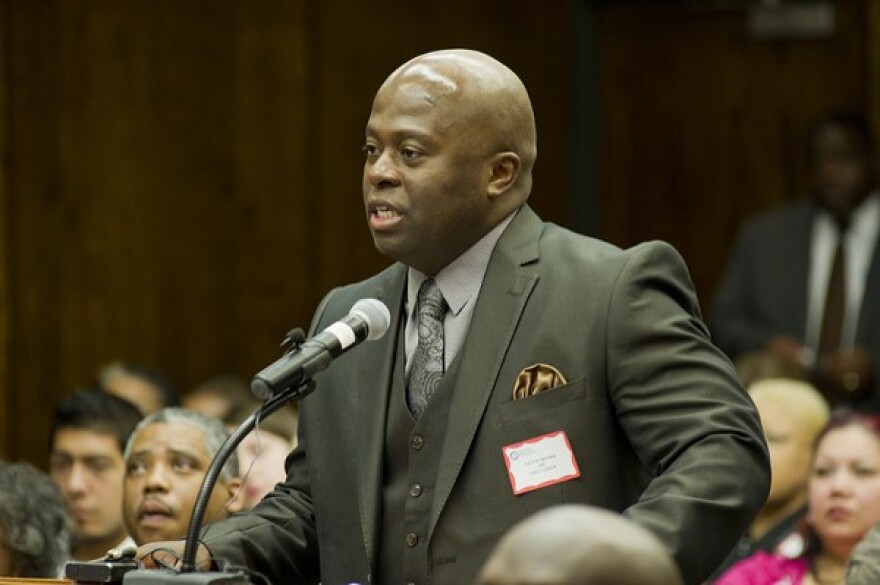Little Rock School District Interim Superintendent Dr. Dexter Suggs had planned to hold a town hall meeting Monday at Central High School but canceled it over the weekend.
Suggs received a volley of criticism last week for not seeking community input early enough for changes at Baseline and Rockefeller Elementary schools. A lawsuit was also filed against him for refusing to release the files of staff under investigation. Suggs apologized at meeting with parents at Rockefeller Elementary Wednesday evening.
“We have to do a better job as far as communication. You know, communication is everything, so we have to do a better job.”
And afterwards told KUAR he knew nothing of the information requests or the lawsuit.
SUGGS: “That, I have no... I have no knowledge of any lawsuit.”
KUAR: “I have the emails, so I could show them to you.”
SUGGS: “You have got the emails?”
KUAR: “Well, I have emails I understand were forwarded to you as FOIA requests.”
SUGGS: “I haven’t seen them ma’am.”
That day, the liberal investigative blog, Blue Hog Report, accused Suggs of plagiarizing his 2009 dissertation for a Doctorate of Education, at Indiana Wesleyan University, on the role of school principals in helping students use technology in Indianapolis middle schools.
The blog published entire paragraphs of the dissertation, copied verbatim, side by side with original sources. Suggs later denied the allegations.
Representative John Walker, D- Little Rock, said he has known about the issue for some time. He says he started making Freedom of Information Act requests for the dissertation when he learned Suggs scored between a 13 and 15 on his ACT. Walker says such issues were not vetted by the District’s hiring committee when they picked Suggs.
“Many people make good impressions at interviews. He made a good impression to the interviewing committee. I was a member of the interviewing committee that interviewed him,” said Walker. “I did not vote for him but he was smooth. He’s still smooth. But I took the position then that he had no substance and I still that position,” he added.
Dr. Thomas Jacobson runs McPherson & Jacobson LLC, the firm that vetted Suggs’s application for the district.
“We have a company that we do academic verification to make sure the degree they submitted was actually achieved and if we received an official transcript showing they received the degree from the university, we accept that,” said Jacobson.
“ It’s not our position to find out if they did anything in obtaining that degree. That’s the institution’s obligation,” he added.
Donald Sprowl, an administrator at Indiana University, said in a phone interview that the school is aware of the allegations. He said when academic integrity is in question, the school reviews the matter, and may revoke an EDD or PhD if plagiarism claims are substantiated.
“[It] is very common that employers trust universities and the credentials we award. We believe that's very appropriate and we take that responsibility very seriously and we take academic integrity very seriously, said Sprawl. He added that the school’s plagiarism software has improved since 2012.
Dr. Tricia Bertram Gallant, of the Center for Academic Integrity at Clemson University, said occurs within a system that allows them.
“Human beings make bad choices and bad decisions and we can mess up pretty badly. And sometimes that is a representation of our character, especially if there’s a pattern of we don’t learn from it,” she said.
“Sometimes it’s a representation of a one-time bad decision. It’s almost never the case of an individual behaving badly, but an individual behaving badly within a system that either encouraged or didn’t discourage that bad behavior,” she added.
Arkansas Commissioner of Education, Johnny Key, said in a press release he will not jump to conclusions.
“Accusations of this nature must be and will be taken seriously, but a rush to judgment does not serve the public interest,” said a spokesperson for Key.
According to Gallant, while plagiarism violates the School Superintendents code of ethics, it will be up to local leaders to make a decision about how to respond if the allegations are true. According to Gallant, the right choice in that case is not always clear.
“The tendency for us as Americans to see ethics as a side thing we can only bother with if everything else is ok is actually probably a part of the problem,” she said.
“Now having said that, sometimes the motivation for finding the plagiarism is biased and may be political, but that doesn’t change the fact that there was plagiarism,” added Gallant.
Meanwhile, leadership of the Little Rock School District is working to cut costs before it loses $40 million in annual desegregation funding by 2017.
The district, which was taken over by the state in January, must also address its six schools in academic distress. Suggs declined to speak to KUAR further under advice of his lawyer.





